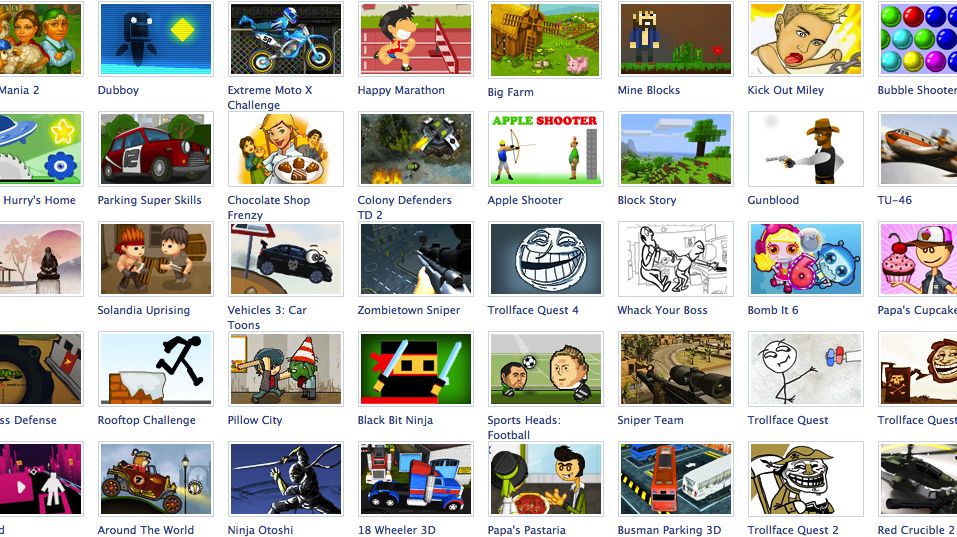Facebook's got game: social network makes its dev play, doesn't forget users
Your 'portal into games'

Facebook is serious about social. And since, according to Facebook, gaming is social, Zuck's crew is serious about it, too.
The message came through clearer than a Bejeweled gem at this week's GDC, and the company has made several plays to woo the game-maker crowd here.
"It's a great time to be working on games at Facebook," said Dan Morris, head of North American & Mobile Games Partnerships at Facebook during a media roundtable Wednesday. "We are increasingly understanding thanks to user data coming back to us that games are a fundamental human interest."
One could argue Facebook has become a fundamental human interest as well.
By the numbers, Facebook has 1.2 billion monthly users. But you already knew that. What you may not have known is that the service also counts 945 million monthly mobile users, and an average of 375 million people play Facebook-connected games a month.
A final number: Facebook figures its website and mobile apps send 735 million referrals to games every day. In the words of Morris, Facebook acts as a "portal into games."
The discovery problem
Facebook has spent the week working to convince developers to go cross-platform, or put their games on mobile and the "Facebook Canvas," a.k.a. the desktop browser. As we reported Monday, Facebook's own studies have found that cross-platform gamers generate 3.3 times the revenue as those who stick to desktop. Engagement is also higher for those who game on both mobile and desktop as opposed to one or the other.
Get daily insight, inspiration and deals in your inbox
Sign up for breaking news, reviews, opinion, top tech deals, and more.
Aaron Brady, games engineering manager at Facebook, said during the roundtable that gaming partners first approached the company about wanting cross-platform play, prompting the internal studies.
What did the findings reveal? "Yeah, this is big," said Brady.
The players may be there and they may be paying and engaging on the run and at their desks, but as Morris acknowledged, there is a "discovery problem looming large over gaming."
However, while the majority of games may be buried in other app stores, Facebook presents a "unique opportunity" for developers to connect with an audience because of its mobile and desktop audiences, Morris reasoned.
"[We want to] allow a game developer to deploy a game on to the widest possible audience on the day they launch and find as many people on as many screes as they can," Morris said.
One way the company is helping users discover games is through improved game requests, announced during GDC.
Instead of opaque alerts that don't tell you anything about what a friend has sent, requests will now contain specific information.
"Tommy sent you a request" will be replaced with "Tommy asked you for a life," or whatever. This way, gamers can better decide if they want to act upon the request and game developers can see which requests perform and which fall flat.

Morris, Brady and Vishu Gupta, head of games engineering at Facebook, each talked about how Facebook helps push games to users, but we wondered about the flip side. Couldn't users feel spammed by game recommendations and other forms of game marketing when they just want to check their news feed?
"We try to think about what's the right game for this user," Gupta offered. "We invest a lot in figuring out what's the best game for a user to play. It's more of a quality question than a quantity question."
He said the "number of signals is pretty huge" when it comes to figuring out what games to recommend to which users. Past playing history and responses to game ads and requests are among the signals Facebook looks at before sending recommendations, Gupta revealed.
Playing with friends
Facebook seems committed to getting games on both mobile and desktop, not preferring one to the other. Brady noted the company aims for parity between the services and tools it provides game developers for both platforms.
The company didn't provide a figure on how many games are available through Facebook at the moment, but Morris noted the company's game front is "seeing more success in more genres than before."
Many of the top titles are mid- to hardcore games, and "hardcore strategy games" amount to some of the game network's most successful.
Facebook may have the users and the tools to help developers reach a broad audience, but Morris said the company has one more trick up its sleeve.
"What's cool about Facebook as a game matching network is it's friends," he said. "It's games layered onto of the social graph. It's what's exciting about our product."
Michelle was previously a news editor at TechRadar, leading consumer tech news and reviews. Michelle is now a Content Strategist at Facebook. A versatile, highly effective content writer and skilled editor with a keen eye for detail, Michelle is a collaborative problem solver and covered everything from smartwatches and microprocessors to VR and self-driving cars.
